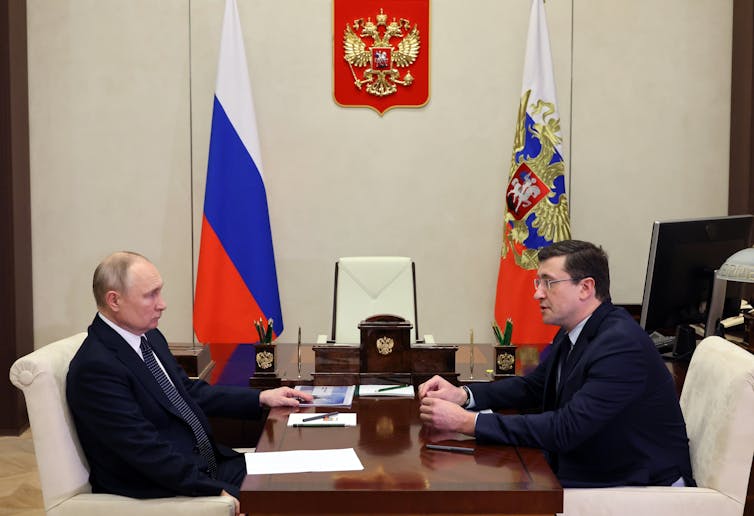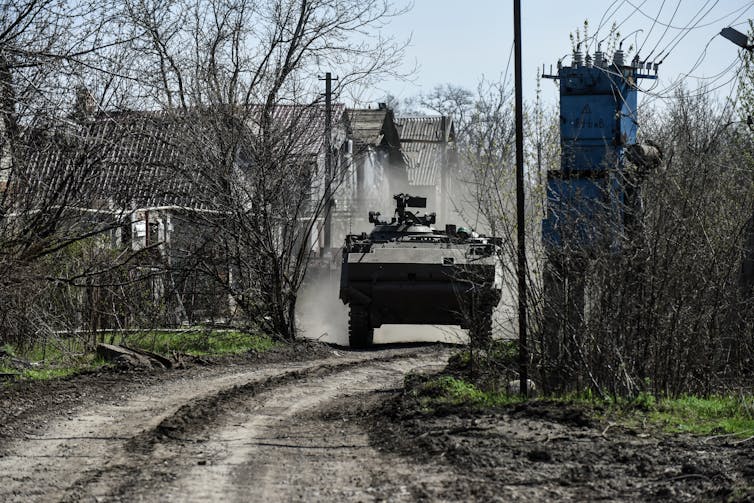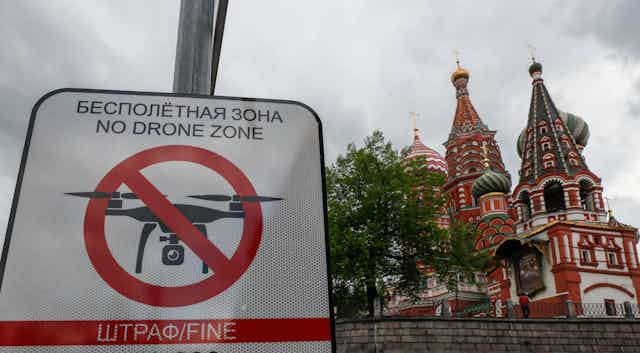Whether the alleged drone assassination attempt on the Russian president in the Kremlin was an audacious attack by Ukraine or a clumsy attempt at a false flag operation by Moscow may never be known. But from the Kremlin’s standpoint, at least Russia now has footage of its own, demonstrating its ability to shoot down drones the way Ukraine has for more than 12 months of the war.
The Kremlin has portrayed the incident as “a planned terrorist attack and an attempt on the president”, thwarted by “timely actions taken by the military and special services”. The attackers are portrayed as inept in their execution and ill-prepared in their planning. It’s well-known that Putin rarely, if ever, stays overnight in the Kremlin.
The “assassination attempt” scenario requires a degree of credulity that surely only exists among Putin’s ardent supporters. The footage of the attack shows a quadcopter drone flying in at an oddly convenient photogenic angle. The notion that this could be an actual attempt on Putin’s life ignores the fact that a device of this size can carry only a small payload, relatively slowly and over a short distance. What’s more, the centre of Moscow is a drone no-fly zone and the large Kremlin complex is both heavily defended and fortified. So the likelihood of getting anywhere near Putin was a non-starter.
Unless the attack was simply motivated by the kudos of demonstrating an ability to strike at the heart of Russian power, it makes no military sense on Kyiv’s part. If Ukrainians were able to smuggle an armed drone into Moscow, a much better target would be the Victory Day parade in Red Square scheduled for May 9 where Putin is usually out in the open – a much easier target.
Such a drone attack on a military parade occurred in 2018 in Caracas in an alleged attempt on the life of Venezuelan president, Nicolás Maduro – so it is not without precedent. So, even if the motivation for a drone attack by Kyiv was for kudos, you would think that an attack on Victory Day would be preferable to a night raid on an empty Kremlin.
When you add to that Kyiv’s unambiguous denial of any involvement in the raid, it raises the question of who would have chosen to attack the Kremlin that way?
An act of theatre?
So if this was not a Ukrainian attack, what could be the motivation of Russia for staging its own act of mobile phone theatre? In the past, Putin – then prime minister in the dying days of the presidency of Boris Yeltsin – allegedly staged terrorist bombings of apartment blocs in Moscow to justify an even more violent second war in Chechnya in 1999.
The official Kremlin statement already alluded to Russia reserving “the right to take countermeasures wherever and whenever it deems appropriate”. The subsequent heavy attacks on Kyiv and Odesa by drone and missile bombardment are consistent with the revenge narrative – but then such attacks also occurred before the Kremlin incident.

Russia, it is clear, needs no additional justification to target civilians, as it did last week – and has consistently for the past year. Russia’s barbarous and illegal killing of ordinary Ukrainian civilians has been a constant feature of this conflict.
Another explanation might be that the attack was designed to distract Russian public attention from actual Ukrainian drone attacks elsewhere, such as the more significant attack on a Crimean oil depot on April 29. But given the planning required to prepare for such a stunt – as well as the narrative that has followed – this too is unlikely.
More plausible is that this alleged attempt on Putin’s life will be used for other purposes. It could be to used to justify another round of mobilisation or the release of new casualty figures. Or it might be used to explain Putin’s absence from the military parade next week on security grounds. Victory Day parades have already been cancelled elsewhere in Russia, supposedly on security grounds.
Read more: Ukraine war: Russia scales back May 9 Victory Day celebrations amid fear of popular protests
In reality, there are neither the available military vehicles nor soldiers to spare for these events given the scale of the conflict and its associated casualties. Another potential embarrassment for the Kremlin is that family members would parade carrying photographs of their recently dead relatives which would show to the world the scale of the losses.
Above all, there is nothing to celebrate for Putin 15 months into the war. Despite the best efforts of Russian forces, Ukraine is still holding onto the fiercely contested ruins of the city of Bakhmut, which would have been the first notable gain since the fall of Soledar in January this year.

Whatever the motivation for the drone attack on the Kremlin, the timing is instructive. With its focus on its anticipated counter-offensive, Ukraine would be unlikely to undertake anything that risked the perception of escalation involving an attack on the Russian capital and leadership headquarters.
For Russia, by contrast, the attack may be used as a way to stiffen public resolve ahead of the Ukrainian counter-offensive, as well as portray their leader as someone who – like them – is vulnerable to attack. Whichever way one looks at it, what seems likely to be the latest theatrics staged by the Kremlin expose, rather than mask, the fact that this coming May 9 will be yet another no-victory day for the Russian president.
Read more: Ukraine: Victory Day celebrations can't mask how badly things are going for Vladimir Putin

